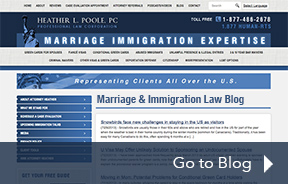Consequences of Unlawful Entry
Ineligibility for a Green Card through Adjustment of Status process
An individual will not be able to obtain a green card through the Adjustment of Status process (i.e., without having to leave the US and process the case at a consulate abroad) if s/he:
- entered the U.S. without permission; or
- entered lawfully but then overstayed the allowed time granted and is now out of valid immigration status; or
- worked in the U.S. illegally (without permission from CIS), unless the person is an immediate relative of a U.S. citizen; or
- is a “Transit without a Visa” holder or a holder of a Visa Waiver (WT or VT) unless an immediate relative of a U.S. citizen; or
- entered the US on a K-1 fiance visa but then seeks to apply for adjustment of status on a different basis than the marriage; or
- an immigrant visa number is not immediately available (applicant must have a current priority date or be an immediate relative of a U.S. citizen.
The above are the most common reasons why a person may not be eligible to apply for adjustment of status.
Exception: Amnesty and 245(i)
Section 245 (i), which was available until April 30, 2001, allowed any person who entered the U.S. illegally or who had overstayed a visa and was now out of status, to apply for a green card through adjustment of status, despite being unlawfully present, if the noncitizen had a family member or employer willing to sponsor him or her for an immigrant visa and filed this application before the April 30, 2001 deadline.
Grandfathering under 245(i). Even though 245(i) is expired and no longer available to allow adjustment for those unlawfully present, some noncitizens may still be able to take advantage of this law and not have to leave the U.S. to consular process, if an immigrant visa case was filed for them before the deadline but the person now wishes to file a different immigrant visa case due to changed circumstances (i.e., a new employer or new marriage). The original case had to be “approval when filed” in order for you to use a new case to take advantage of the expired 245 (i) amnesty-type provision.
This is a legal standard that is best explained by an immigration lawyer, who can better determine if you would be able to file a new case and take advantage of grandfathering.
Consequences of Unlawful Overstay
The 3 and 10 year bars to re-entry
The 1996 Illegal Immigration Reform and Responsibility Act (IIRAIRA) created three year, ten year, and permanent bars on admission to the U.S. for a variety of immigration status violations.
These bars apply widely and affect immigrants who have family in the U.S., have worked and paid taxes in the U.S., and in many cases are otherwise eligible for permanent resident status.
The three year bar to re-entry into the U.S.: The three year bar applies to individuals who have been unlawfully present in the United States for a continuous period of more than 180 days, but less than one year, and who voluntarily depart the U.S.
The ten year bar to re-entry into the U.S.: The ten year bar applies to individuals unlawfully present in the U.S. for an aggregate period of one year or more who depart voluntarily. Unlawful presence begins to accrue when the period of authorized stay expires or after an entry to the U.S. without inspection.
The following classic example highlights the excessive harshness of these bars:
Example: An individual applies for and receives a 10 year visitor visa and enters the U.S. pursuant to such visa to visit family. At the border, the inspecting immigration officer annotates Form I-94 (white card stapled inside of passport) by hand authorizing only a 90 day period of admission. The visitor, believing the visa authorizes his stay in the U.S. for the next 10 years, does not realize that the annotated Form I-94 limits his period of stay and he remains in the U.S. for 10 months. At day 91 of his stay in the U.S., he begins to accrue unlawful presence and 180 days after that, he automatically becomes subject to the 3 year bar on reentry if he departs the U.S. (If he were to stay in the U.S. for a year after hitting day 90, he would become subject to the 10 year bar on reentry upon departure from the U.S.)
Now even if this individual is eligible to become a permanent resident through family or employer sponsorship, s/he will be unable to attain that status if this bar is in place. S/he is ineligible for adjustment of status (Section 245(i) of the Immigration and Nationality Act has expired), and is ineligible to receive a permanent immigrant visa at a U.S. consulate until he has been outside the U.S. for the 3 (or 10 depending on the circumstances) year period.
If the immigrant is married to a U.S. citizen or lawful permanent resident or has a U.S. citizen or LPR parent, a WAIVER MAY BE AVAILABLE for 3 & 10 year bars. Click here for more information on waivers. In some cases, a waiver may be applied for and approved prior to traveling abroad for a consulate immigrant visa interview, making the potential separation period very minimal under the provisional waiver program for I-601a filings.
Contact us today to find out if you are eligible for a waiver and the chances of a waiver being approved (if Heather is your attorney) in your case! There are many different factors that consulates consider and waiver cases are big undertakings, especially for expedited cases that can still be filed at consulates, bypassing the CIS process in the US. Heather also has a 100% approval rate for US filed waiver cases – Don’t run out of time to make a strong case! Heather has a very high approval rate on waiver cases, with waiver approvals from some of the world’s toughest CIS offices before filings were centralized in the US (including Lima, Peru- handling South American countries and Bangkok, Thailand (South Asia, Australia), as well as 99% approvals on Mexican cases. She has experience with consulates all over the world.
TO BOOK AN ATTORNEY CASE EVALUATION APPOINTMENT,
CALL: 877.486.2678 or Book Online Here.
I-601A process: There are special types of waiver processing where you can stay with your loved one for longer and don’t have to worry about long separation periods for those who only have the 3 and 10 year bars (the unlawful presence bars). Check out out waiver page for more information on the latest changes!
Unlawful Re-entry/Attempted Re-entry after previous Unlawful Stay/Entry in U.S.
Any person who has ever been ordered removed (or has resided in the U.S. unlawfully for more than 1 year in the aggregate), leaves the United States, and then returns or attempts to return without being lawfully admitted, must remain outside the U.S. for 10 years before being able to re-apply for an immigration benefit or re-entry. This law was not in effect until April 1, 1997.
Attempted Re-entry on the same visa after previous Overstay on that same visa
A nonimmigrant visa holder will not be allowed re-entry into the U.S. if s/he overstays the time authorized in the U.S. on his or her last entry unless s/he obtained a new visa at the consular office in the country of his or her nationality or another consular office if there is no consular office in her home country. There are limited exceptions to this rule, depending on what country and type of visa you have.
Consequences of working unlawfully on an expired temporary visa
An employment-based green card applicant will not be able to apply for a green card through the adjustment of status process in the U.S. (i.e., will have to consular process) if s/he worked without authorization (worked illegally) for more than 180 days. A family-based green card applicant, if filing based on any relationship other than an immediate relative of a U.S. citizen (spouse, child under 21, parent), will not be able to use the adjustment of status procedure to apply for a green card in the U.S. but will have to consular process if the applicant ever worked without legal authorization while in the U.S.
Overstay Rules for Visa Waiver Countries Are Changing!
Visa waiver entrants benefit from a program that Congress created allowing citizens of certain countries to come to the U.S. as tourists for 90 days or less without visitor’s visas. To get the government waiver of the usual visa requirement, the tourist has to sign a wiaver of his or her own right to contest removal other than on the basis of asylum. Visa waiver countries include Germany, the United Kingdom, Spain, Belgium, Australia, France, and others. A total of 27 countries currently have this designation.
In a recent 9th Circuit decision (Momeni v. Chertoff, March 31, 2008), the court held that a visa waiver entrant from Germany could not benefit from adjustment of status (green card application) from inside the US despite it being based on marriage to a U.S. citizen, due to overstay after the entrant was placed in removal proceedings before filing for adjustment.
What this case means at least in the 9th Circuit, is that it is riskier for a visa waiver entrant to apply for adjustment after the 90 day alloted stay expires. CIS local offices may interpret this case to apply to visa waiver entrants who overstay their 90 days and then file a green card case (adjustment) whether or not a person is ever placed in removal, leading to a denial of the green card case. It’s a catch in a way, because applying for an adjustment right after entry can lead to CIS concluding that the visa waiver entrant committed visa fraud at entry by really intending to move to the US on their visa waiver (which is the equivalent of a visitor’s visa), which could result in denial of the adjustment application and eventual removal. Caselaw in other circuits may also affect visa entrants’ ability to apply for permanent residency in the U.S.
* * * * *
The above information is general in nature and is not intended to be considered or relied upon as legal advice. You should always consult an attorney to determine if you are eligible to apply for adjustment of status or whether the potential reward of consular processing is worth any risk created by leaving the U.S.
Questions or comments? Contact us at info@humanrightsattorney.com.
TO BOOK AN ATTORNEY CASE EVALUATION APPOINTMENT,
CALL: 877.486.2678 or Book Online Here.






